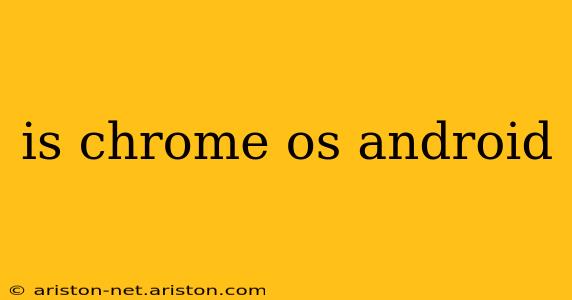Is Chrome OS Android? Understanding the Relationship Between Chrome OS and Android
The relationship between Chrome OS and Android is often a source of confusion. While they share some similarities and are both developed by Google, they are distinct operating systems with different strengths and purposes. Simply put, Chrome OS is not Android, but they are increasingly intertwined.
Let's delve deeper into their differences and similarities to clarify this often-misunderstood connection.
What is Chrome OS?
Chrome OS is a lightweight operating system designed primarily for web browsing and cloud-based applications. Its core functionality revolves around the Chrome browser, offering a streamlined, simple user experience. It boots quickly, runs efficiently on less powerful hardware, and receives automatic updates, keeping it secure and up-to-date. While it supports Android apps (more on that below), its primary focus remains web-based productivity and simplicity.
What is Android?
Android is a mobile operating system, designed for smartphones and tablets. It boasts a vast app ecosystem, a highly customizable interface, and a focus on touch-based interaction. Its strength lies in its enormous app library and its adaptability to various hardware configurations. It's a far more resource-intensive operating system than Chrome OS.
Can Chrome OS run Android apps?
This is where the lines blur. Many Chromebooks, particularly newer models, support Android apps. This integration allows users to access a wider range of applications beyond those available in the Chrome Web Store. However, this doesn't mean Chrome OS is Android; rather, it's a capability built into Chrome OS, allowing it to run Android apps within a contained environment. It's not a seamless integration, and some apps might not function perfectly or might not be optimized for the larger screen of a Chromebook.
Why does Chrome OS support Android apps?
Google's decision to integrate Android app support into Chrome OS was driven by the desire to expand the functionality and appeal of Chromebooks. By providing access to the vast Android app ecosystem, Chrome OS gained a significant advantage, becoming a more versatile platform capable of handling a wider range of tasks, beyond just web browsing.
Are there any limitations to running Android apps on Chrome OS?
Yes, there are some limitations. Not all Android apps are compatible with Chrome OS, and even compatible apps may not always perform optimally. Performance can sometimes be slower than on dedicated Android devices, and the user interface might not be perfectly suited to a larger screen size. Furthermore, Android apps run in a separate environment, so integration with other Chrome OS features might not be seamless.
How are Chrome OS and Android different in terms of file management?
Chrome OS typically uses a simpler file management system, heavily reliant on cloud storage services like Google Drive. Android, while also using cloud storage, provides a more traditional file manager with direct access to local storage. The approaches reflect their differing design philosophies: Chrome OS prioritizes simplicity and cloud integration, while Android offers more control and flexibility.
In conclusion, while Chrome OS now supports Android apps, it remains a distinct operating system with its own focus and capabilities. Understanding these differences is key to appreciating the unique strengths of each platform.
